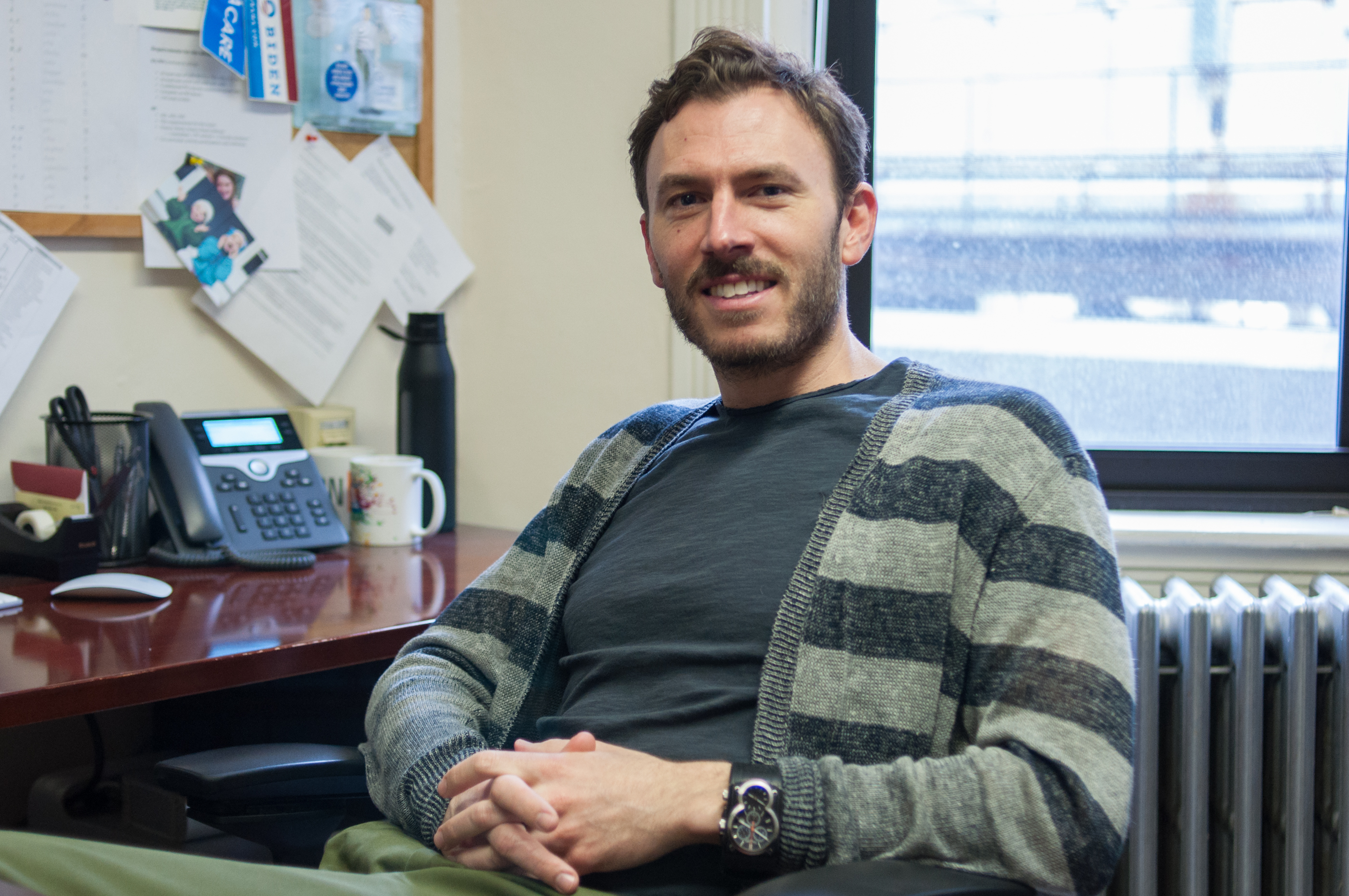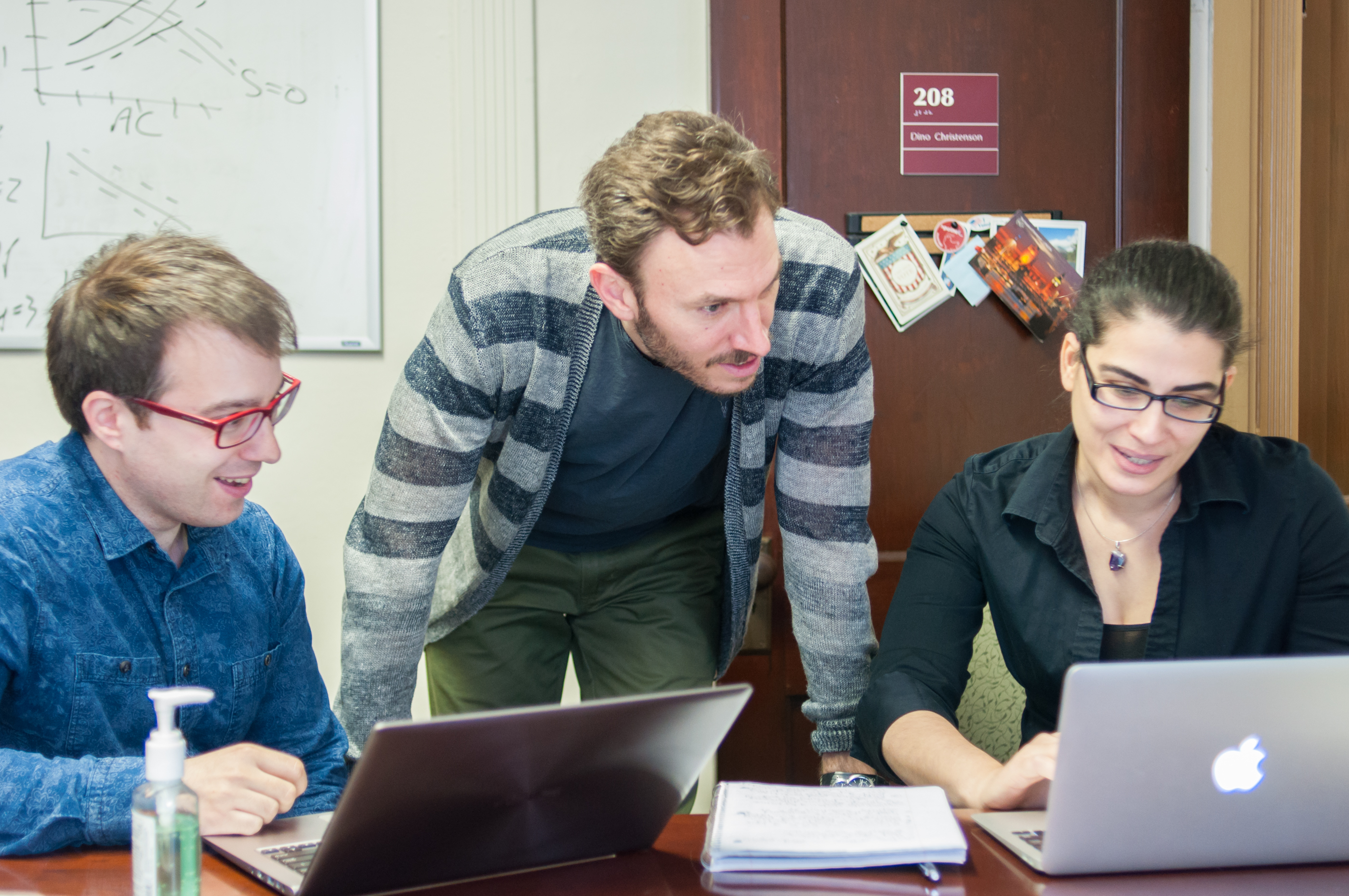Faculty Fellow Spotlight: Dino Christenson (Political Science)
[Return to Nexus Newsletter]
By Yanshu Li
When Dino Christenson gets to his Bay State Road office each morning, he starts his day with a quintessential New England view on one of the most beautiful streets in Boston.
 Christenson joined BU in the fall of 2010 as an assistant professor in the Department of Political Science. Now an associate professor, he actively works with faculty from across the University to facilitate and diversify his research approaches. Appointed a Hariri Institute Junior Faculty Fellow from 2012 to 2015, he continues to bring innovative, data-driven research to the field of political science. In 2010 he co-founded the Research in American and Comparative Politics Workshop (RAC), and in 2016 he co-chaired the inaugural BU Data Science (BUDS) Day, a component of BU’s Data Science Initiative (DSI). He is currently a Faculty Fellow at the Hariri Institute and sits on the Steering Committees for both the Institute and the DSI.
Christenson joined BU in the fall of 2010 as an assistant professor in the Department of Political Science. Now an associate professor, he actively works with faculty from across the University to facilitate and diversify his research approaches. Appointed a Hariri Institute Junior Faculty Fellow from 2012 to 2015, he continues to bring innovative, data-driven research to the field of political science. In 2010 he co-founded the Research in American and Comparative Politics Workshop (RAC), and in 2016 he co-chaired the inaugural BU Data Science (BUDS) Day, a component of BU’s Data Science Initiative (DSI). He is currently a Faculty Fellow at the Hariri Institute and sits on the Steering Committees for both the Institute and the DSI.
Born in Detroit, MI, Christenson’s father worked in real estate development, which took him and his family to live in multiple states, including Texas, Missouri and Florida. Upon joining BU and becoming a Bostonian in 2010, he discovered a major perk of the cold winters: being close to some of the east’s best ski resorts. The seafood culinary options didn’t hurt his initial perception of the region either. In addition to getting to live in different cities and regions, he was exposed to politics through his family’s interests, especially his mother’s love of books and father’s fondness for philosophical discussions. However, throughout his first year in college, Christenson primarily focused on biology and planned to pursue medicine.
The influence of several invaluable mentors would soon change all that for Christenson. Entering the University of Michigan as a pre-medicine major, he took a couple of amazing courses with Christopher Achen, who now teaches political science at Princeton University. In those courses, Christenson learned how to apply statistics and use numerical data to understand political behavior, opinions and attitudes. As Christenson recalls it, Achen had a way of making the difficult parts of the course into fun challenges. It was such an eye-opening experience that he changed his major to political science.
“[The courses] changed my whole perspective on politics,” Christenson says. “There was something refreshing, a novel perspective, a different way of looking at the world. At that point, I thought moving to political science was what was right for me.”
In 2004, after a Masters program in Trent, Italy and working in politics for a couple of years, Christenson began a PhD program in political science at Ohio State University. A number of wonderful mentors, including his eventual dissertation chair Herbert Weisberg (now professor emeritus) and Janet Box-Steffensmeier (now divisional dean) continue to inspire and support his work. Christenson praises his graduate experience with having propelled him to commit to the field as a political scientist and researcher.
 As a political scientist, his contributions, or as he puts it, “attempts at marginal improvements,” are made by reacting to existing research and theories. Political science is a vigorous field where different approaches and methodologies are constantly being applied and then refactored. When pondering challenging questions, Christenson’s first move is to go out and gather data and then carefully analyze the information he’s found. Throughout his career, this study-question-validate method has encouraged him to pursue diverse fieldwork and has motivated him to delve deep into various ideas in the discipline. “Sometimes it turns into a fruitful project. Sometimes less so,” said Christenson. “It takes years and years and years for us to develop and test generalizable theories that we hold strongly.”
As a political scientist, his contributions, or as he puts it, “attempts at marginal improvements,” are made by reacting to existing research and theories. Political science is a vigorous field where different approaches and methodologies are constantly being applied and then refactored. When pondering challenging questions, Christenson’s first move is to go out and gather data and then carefully analyze the information he’s found. Throughout his career, this study-question-validate method has encouraged him to pursue diverse fieldwork and has motivated him to delve deep into various ideas in the discipline. “Sometimes it turns into a fruitful project. Sometimes less so,” said Christenson. “It takes years and years and years for us to develop and test generalizable theories that we hold strongly.”
Much of the data he and his colleagues gather are based on mass surveys and polls, which contain questions on objective political information and public opinions on politics. But, he always expects to scale a few hurdles in any project.
“[The projects] rarely turn out to be perfectly in-line with my expectations, which is a nice part of relying on data,” he says. Christenson places tremendous value on being a data scientist. His reliance on data helps him maintain transparency during data collection process and analyses, which allows him to understand the pros and cons, the strengths and the weaknesses, of the data sets he’s developing. “Our research is based on rigorous application of the scientific method,” he notes. “Ultimately, you put your effort into fully understanding the data so that you can believe your results.”
“For me, political science progress is never linear,” Christenson says. Christenson was initially attracted to political science because of its broad nature. With very little restrictions, there are many areas one can choose to focus on – from studying institutions to analyzing political behavior. Christenson continues to be fascinated by the number of different tools that are put to use in the field.
“Some people study theory or apply a historical perspective, some rely on qualitative tools, and then there are people like me who take a quantitative approach,” he says.
Christenson does believe that the notion of what it means to be a political scientist is often misconstrued. Unlike the natural logic between some degree majors and their corresponding occupations, such as engineering and engineers or statistics and statisticians, studying political science doesn’t typically lead to a career of being a politician. “Studying political science to become a politician is like an oncologist wanting to have cancer,” repeating a joke he heard in graduate school. As Christenson explains, “political scientists want to better understand what is happening in our political process, not necessarily be an elected representative in it.”
Christenson has three loosely-connected research agendas: 1) observing and analyzing the factors that affect presidential nomination campaigns; 2) looking at the institutional and public opinion outcomes related to institutional events, especially Supreme Court decisions; and 3) delving into coalition strategies of interest groups and how these coalitions affect political outcomes.
He is pursuing this third research thrust through the Amicus Curiae Briefs project, which aims to make the data in amicus curiae briefs publicly available and searchable. With funding from the National Science Foundation (NSF), Christenson is collaborating with the Software & Application Innovation Lab (SAIL) at the Hariri Institute for Computing. Working with SAIL Senior Software Engineer Frederick Jansen, Director Andrei Lapets, and with the help of several SAIL student interns, the team is working to realize the project’s platform goals.
“It’s wonderful. It’s a terrific group,” Christenson said. “So hopefully we will have a nice interface and website, and people can just type in ‘ACLU’ or ‘NRA’ to see who they’ve worked with frequently.”
 While cautioning against jumping to conclusions about cause and effect, Christenson sees his work as shedding light on decision making processes. Instead of using the data purely to try and predict outcomes, he aims to use his analysis in conjunction with ever-changing contextual factors to improve overall understanding of the democratic process.
While cautioning against jumping to conclusions about cause and effect, Christenson sees his work as shedding light on decision making processes. Instead of using the data purely to try and predict outcomes, he aims to use his analysis in conjunction with ever-changing contextual factors to improve overall understanding of the democratic process.
“We’d be particularly worried if the interest groups that represented a small number of people, but maybe had a lot of money, were winning all the time, even though the public or a large portion of the public opposed their issue positions. That would suggest that our democratic process isn’t working as well as we would like it to,” says Christenson. In a field where researchers are constantly looking for comprehensive evidence, Christenson places high value on the critiques of his colleagues. “You have to accept resistance. You have to accept failure,” Christenson points out. “I don’t think it’s a field where people want to praise or compliment; we are a bit critical of each other. I think the greatest compliment we can give our colleagues is to critically engage with their work.” “There is nothing worse than being ignored,” he adds.
Before taking off for graduate school, Christenson worked as policy advisors for Jennifer Granholm’s first gubernatorial campaign in Michigan, as well as Barack Obama’s senate campaign in Illinois. As Obama began his ascent to the presidency, Christenson was drawn toward advancing his own career as a political scientist. One of his family’s favorite stories is how Christenson’s grandmother handled his leaving Obama’s team and heading to graduate school. After the election, his grandmother would call and say, “you know where you’d be if you stuck with that Obama guy? Maybe in the White House!”
“She loves to remind me of the decision to leave that team,” Christenson says with a smile. “But now I am very happy with what I am doing.”
